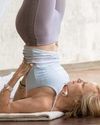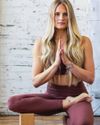Are common cues in standing poses wreaking havoc on your knees, sacroiliac joint, and lower back?

Yoga teachers almost universally advise their students to place their ankles and big toes together or line up their feet under their hips with the outside edges parallel to the edges of the mat— in Tadasana (Mountain Pose) or Utkatasana (Chair Pose). The most anatomically inclined teachers urge students to align their feet so the second toes are pointing straight forward, positioning the tibias (shin bones) relative to the feet.
While aligning your feet in these ways may seem like a good idea, especially if you are splay-footed or pigeon-toed, it could cause long-term damage to your knees, other joints, and lower back. Here’s why—and how you can avoid it.
Foot and leg anatomy
Your legs technically start from your 12th ribs, which sit beside your lumbar (lower) vertebrae. They include the psoas and quadratus lumborum muscles as well as the rest of the pelvic muscles that move or stabilize the hip joints.
The feet and legs are constructed as a series of hinge joints, known as single-degree-of-freedom joints, alternating with rotational (multiple-degree of-freedom) joints.
The balls of your feet are five joints that together act as a hinge when you go on tiptoe. Above them is the rotational joint under your ankle: Rock your feet in and out from collapsed pronation (an exaggerated rolling in of the heel toward the midline) to locked-up supination (heels roll out) to feel this joint.
The upper ankle joint is also a hinge. From a standing position, bend your knees and bring them back to locked to feel your lower legs hinging over your feet from dorsiflexion (a decreased angle between your foot and shin) to plantarflexion (an increased angle).
This story is from the November 2018 edition of Yoga Journal.
Start your 7-day Magzter GOLD free trial to access thousands of curated premium stories, and 9,000+ magazines and newspapers.
Already a subscriber ? Sign In
This story is from the November 2018 edition of Yoga Journal.
Start your 7-day Magzter GOLD free trial to access thousands of curated premium stories, and 9,000+ magazines and newspapers.
Already a subscriber? Sign In

Learning to Hear the Voice of Self-Care
How to discern what really matters.

Inclusive Yoga for All
A Down syndrome diagnosis set this family on a path to make yoga accessible to everyone.

For the Joy of Practice
Doing yoga without attachment to the outcome can bring unexpected gifts.

Be Kind to Your Spine
Your vertebral column is a series of complex, interconnecting parts that support your every movement. Here's how to keep it safe.

A Skeptic of Chakra Balancing
The experience helped me make peace with things that can't be explained.

Are We Having Fun Yet?
Bring play back into your practice with three styles of yoga that can get you out of your head and bring a smile to your face.

12 Ways to Use Blocks You've Probably Never Tried Before
The beauty of blocks? They not only meet you where you are in your practice, they take you beyond where you ever thought you could go.

THE SCIENCE OF AWE
THOSE MOMENTS IN LIFE THAT STOP YOU IN YOUR TRACKS IN ASTONISHMENT? RESEARCH SAYS EXPERIENCING MORE OF THEM CAN CHANGE YOUR LIFE.

What Your Doshas Say About Your Dharma
Ayurveda can explain so much more than what's out of balance.

The Future of Yoga
Yoga has been evolving for thousands of yearsfrom a mind-and-body spiritual practice to a billion-dollar "lifestyle" practice. What's next? We asked futurists, teachers, and thinkers what to expect in the next decade and beyond.